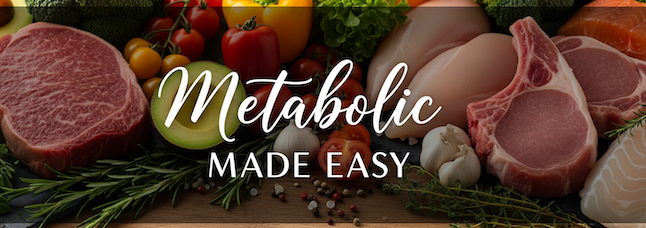The Ketogenic Diet: Your Path to Metabolic Health and Wellness
Overview of the Ketogenic Diet
The ketogenic diet (or keto for short) is a high-fat, low-carbohydrate, moderate-protein eating plan designed to shift your body into a metabolic state called ketosis. In ketosis, your body burns fat for fuel instead of glucose (sugar), which can lead to a range of health benefits. This diet mimics the effects of fasting while allowing you to eat satisfying, nutrient-rich foods.

Health Benefits of the Keto Diet
The keto diet isn’t just about weight loss—it’s a metabolic reset with wide-reaching effects, supported by scientific evidence:
- Weight Loss: Rapid fat burning and reduced appetite help shed pounds efficiently. Studies show keto leads to greater short-term weight loss compared to low-fat diets.
- Blood Sugar Control: Lower insulin levels and improved glucose regulation benefit those with type 2 diabetes. Research indicates it can reduce HbA1c and medication needs.
- Reduced Inflammation: Ketones like BHB have anti-inflammatory properties, potentially easing conditions like arthritis.
- Improved Heart Health: Lower triglycerides and increased HDL (“good”) cholesterol, though monitor LDL changes.
- Mental Clarity & Energy: Stable energy levels and reduced brain fog, with emerging evidence for mental health benefits like in bipolar disorder.
- Therapeutic Uses: Proven for epilepsy and explored for neurological conditions like Alzheimer’s and cancer support.
"The ketogenic diet reduces insulin resistance in addition to promoting weight loss and improving blood sugar, triglycerides, and high-density lipoprotein cholesterol." — Stanford Medicine expert.
"Within three months of starting a well-formulated ketogenic diet, all flares were gone!" — A user sharing their success with autoimmune issues on Diet Doctor.
What You Can Eat on Keto
The keto diet focuses on whole, nutrient-dense foods that are low in carbs and high in healthy fats:
Keto-Friendly Foods
- Proteins: Beef, chicken, pork, lamb, eggs, fatty fish (salmon, sardines)
- Fats & Oils: Avocado, olive oil, coconut oil, butter, ghee
- Low-Carb Veggies: Spinach, kale, broccoli, cauliflower, zucchini
- Dairy: Full-fat cheese, Greek yogurt, cream
- Nuts & Seeds: Pecans, macadamia nuts, chia seeds
- Beverages: Water, coffee, tea (unsweetened)
Foods to Avoid
- Bread, pasta, rice, potatoes
- Sugary snacks and drinks
- Most fruits (except berries)
- Processed foods and seed oils (e.g., canola, soybean)

How to Start & Maintain a Keto Diet
Starting keto can feel like a big shift, but with the right approach, it becomes second nature:
Getting Started
- Cut Carbs: Aim for 20–50g net carbs per day
- Eat Whole Foods: Focus on unprocessed, high-fat, low-carb meals
- Track Macros: Use apps to monitor fat, protein, and carb intake
- Stay Hydrated: Drink plenty of water and replenish electrolytes
- Prepare for Keto Flu: Temporary symptoms like fatigue or headaches may occur as your body adapts
Maintaining Keto
- Meal Prep: Plan and cook meals ahead to avoid carb temptations
- Intermittent Fasting: Combine with keto for enhanced fat burning
- Stay Consistent: Avoid cheat days to maintain ketosis
- Monitor Progress: Use ketone strips or apps to track your state
"I've lost over 100 pounds. I've cured my sleep apnea and haven't used a CPAP machine in a year." — Keto success story from Ruled Me.
Types of Keto Diets
There’s no one-size-fits-all approach—choose the version that fits your lifestyle. Click on each type for a dedicated page with more details.
| Type | Description | Best For |
|---|---|---|
| Standard Keto (SKD) | 70–75% fat, 20–25% protein, 5–10% carbs | Beginners, weight loss |
| Advanced Ketogenic | Even stricter carbs (3%), higher fats (82%) | Deep ketosis, therapeutic support |
| Therapeutic Keto | Strict ratios (e.g., 4:1 fat:non-fat) for medical conditions | Epilepsy, chronic illness |
| High-Protein Keto | Slightly more protein (60% fat, 35% protein, 5% carbs) | Muscle maintenance |
| Cyclical Keto (CKD) | 5 keto days followed by 2 high-carb days | Athletes, bodybuilders |
| Targeted Keto (TKD) | Small carb intake around workouts | Active individuals |
| Lazy/Dirty Keto | Focuses only on carb limits, not food quality | Simplicity, short-term goals |
| Clean Keto | Emphasizes whole, nutrient-rich foods | Long-term health |
| Mediterranean Keto | Combines keto with Mediterranean principles (olive oil, fish, veggies) | Heart health, sustainability |
Final Thoughts
The ketogenic diet is more than a trend—it's a lifestyle shift that can transform your health, energy, and relationship with food. Whether you're here to lose weight, manage a condition, or simply feel better, keto offers a structured yet flexible path forward. Always consult a healthcare professional before starting, especially if you have medical conditions.
"Previous research shows good evidence of a faster weight loss when patients go on a ketogenic or very low carbohydrate diet compared to participants on a more traditional low-fat diet." — Harvard Health.
Resources and Citations
- Ketogenic Diet - StatPearls - NCBI Bookshelf (Comprehensive overview and types)
- The Potential Health Benefits of the Ketogenic Diet - PubMed Central (Scientific evidence on benefits)
- The Ketogenic Diet: A Detailed Beginner's Guide to Keto - Healthline (Beginner guide and food lists)
- 10 Types of the Keto Diet - Everyday Health (Detailed types breakdown)
- 300+ Keto Success Stories - Diet Doctor (User testimonies)
- Pilot study shows ketogenic diet improves severe mental illness - Stanford Medicine (Mental health benefits)
